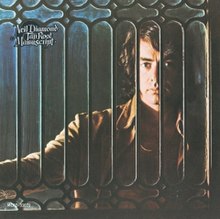Tap Root Manuscript
| Tap Root Manuscript | ||||
|---|---|---|---|---|
 Original vinyl LP album cover | ||||
| Studio album by | ||||
| Released | October 15, 1970[1] | |||
| Recorded | 1970 | |||
| Genre | Rock, world | |||
| Length | 35:30 | |||
| Label | Uni | |||
| Producer | Tom Catalano, Neil Diamond | |||
| Neil Diamond chronology | ||||
| ||||
| Singles from Tap Root Manuscript | ||||
| ||||
| Review scores | |
|---|---|
| Source | Rating |
| AllMusic | |
| Rolling Stone | (mixed)[3] |
Tap Root Manuscript is the sixth studio album recorded by Neil Diamond, released in October 1970. It was one of the most experimental albums he ever recorded, featuring rock music fused with prominent African sounds and instruments. The album was a commercial success, going Gold in three months, eventually certified Platinum by the RIAA.[1] The album's success was powered primarily by "Cracklin' Rosie", his first number 1 single, with help from Diamond's cover of "He Ain't Heavy, He's My Brother", which rose to number 20.[4] The latter song had been a major hit for the Hollies the previous year.
While the first side of the LP contained five pop rock songs, Side Two was a conceptual suite of related songs expressing an African theme, titled "The African Trilogy". Within this suite was the song "Soolaimon", which rose to number 30 in the US.[4] The 19-minute suite saw African folk styles twined with blues and gospel elements to create what Diamond called "a folk ballet".[5] This effort predates many Western pop artists' interest in world music, for instance Peter Gabriel's 1980 founding of World of Music, Arts and Dance (WOMAD), and the African-influenced album Graceland by Paul Simon in 1986.[6] Tap Root Manuscript was one of the most novel experimental recording projects of its time, and the Uni label, to which Diamond was then under contract, initially was not sure whether it would be commercially viable.
Cash Box said of the single "Soolaimón" that "Neil Diamond applies his composer's sophistication in an approach at primitivism that stands apart as a new slant on top forty sound. The effect is very much like a 'Brother Love' and 'Brooklyn Roads' gone afro with excellent results."[7] Record World said that "Neil Diamond is into some far out things with 'Soolaimon.'"[8]
Track listing
All selections written and composed by Neil Diamond except "He Ain't Heavy, He's My Brother," written and composed by Bob Russell and Bobby Scott.
| No. | Title | Length |
|---|---|---|
| 1. | "Cracklin' Rosie" | 3:00 |
| 2. | "Free Life" | 3:11 |
| 3. | "Coldwater Morning" | 3:20 |
| 4. | "Done Too Soon" | 2:45 |
| 5. | "He Ain't Heavy, He's My Brother" | 3:59 |
| Total length: | 16:15 | |
| No. | Title | Length |
|---|---|---|
| 1. | "Childsong" | 2:10 |
| 2. | "I Am the Lion" | 2:07 |
| 3. | "Madrigál" | 1:53 |
| 4. | "Soolaimón" | 4:32 |
| 5. | "Missa" | 2:05 |
| 6. | "African Suite" | 4:28 |
| 7. | "Childsong (Reprise)" | 2:00 |
| Total length: | 19:15 | |
Charts
| Chart (1970-1971) | Peak position |
|---|---|
| Australian Albums (Kent Music Report)[9] | 31 |
| Canada Top Albums/CDs (RPM)[10] | 13 |
| UK Albums (OCC)[11] | 18 |
| US Billboard 200[12] | 13 |
Certifications
| Region | Certification | Certified units/sales |
|---|---|---|
| United States (RIAA)[13] | Platinum | 1,000,000^ |
|
^ Shipments figures based on certification alone. | ||
References
- ^ a b "Gold & Platinum". Recording Industry Association of America.
- ^ Tap Root Manuscript at AllMusic
- ^ Rolling Stone review Archived October 2, 2007, at the Wayback Machine
- ^ a b "Neil Diamond". Billboard.
- ^ Plasketes, George (2016). B-Sides, Undercurrents and Overtones. Routledge. p. 86. ISBN 9781317171133.
- ^ Joseph K. Adjaye; Adrianne R. Andrews, eds. (1997). Language, Rhythm, & Sound: Black Popular Cultures Into the Twenty-first Century. University of Pittsburgh Press. p. 253. ISBN 9780822939672.
- ^ "CashBox Singles Reviews" (PDF). Cash Box. April 18, 1970. p. 32. Retrieved 2023-04-28.
- ^ "Single Picks of the Week" (PDF). Record World. April 18, 1970. p. 1. Retrieved 2023-04-28.
- ^ Kent, David (1993). Australian Chart Book 1970–1992. St Ives, New South Wales: Australian Chart Book. ISBN 0-646-11917-6.
- ^ "Top RPM Albums: Issue 3735". RPM. Library and Archives Canada. Retrieved June 4, 2023.
- ^ "Neil Diamond | Artist | Official Charts". UK Albums Chart. Retrieved June 4, 2023.
- ^ "Neil Diamond Chart History (Billboard 200)". Billboard. Retrieved June 4, 2023.
- ^ "American album certifications – Neil Diamond – Taproot Manuscript". Recording Industry Association of America.
